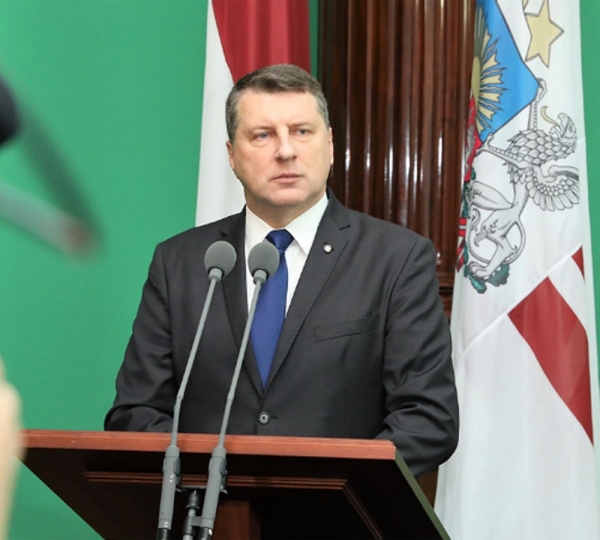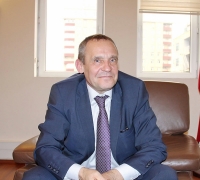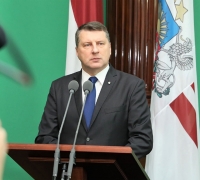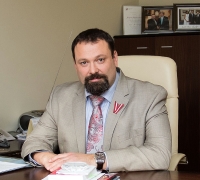Caspian Energy (CE): Your Excellency, in 2018 Azerbaijan and Latvia, which are strategic partners, were celebrating the 100th anniversary of independence. How do you see the future of relations with Azerbaijan and other countries of the Caspian region? What hinders to develop economic relations more effectively?
Rájmonds Véjonis, President of the Republic of Latvia: Azerbaijan is an important partner to Latvia in the South Caucasus region. Close cooperation has been established not only between the leaders of our countries, but also parliaments, governments, local authorities and other institutions.
In January 2019, we celebrated the 25th anniversary of the establishment of diplomatic relations between Latvia and Azerbaijan. During the official visit of the President of Azerbaijan to Latvia in June 2017 the declaration on strategic partnership was signed, thereby raising our relationship to a new level of cooperation. There is a huge potential for further expansion of our relations, especially in economic and trade areas. Current bilateral trade turnover does not reflect the real economic potential between our countries. Investment in small and medium size business would bring a lot of benefit to our economic relations.
CE: What potential exists for Azerbaijani investors and vice versa?
Rájmonds Véjonis: Latvian companies in Azerbaijan work in a wide range of sectors, including financial, consulting and legal services, transport and logistics, engineering, IT and telecommunications, food production, architecture, construction, building materials, wood processing, chemicals, pharmaceuticals, tourism and education fields. Latvia is interested in expanding this cooperation. Main exports from Azerbaijan to Latvia are food production, plastic and rubber goods and mechanical and electric equipment.
We are glad, that in 2018 Azerbaijan decided to open the Trade House in Riga, to facilitate trade and economic ties with Latvia. Azerbaijan has expressed interest in developing cooperation with Latvia in food, pharmaceutical and industrial sectors and establishing agricultural joint ventures. To boost our cooperation in transit services, investment in Latvia’s ports and centers for logistic is welcome.
CE: Does Latvia consider issues of joining to expanding transport transit corridors such as North-South and Baku-Tbilisi-Kars, of which Azerbaijan is a leading proponent?
Rájmonds Véjonis: Latvia is interested to cooperate with Azerbaijan in land transport connections between Asia, Central Asia, Black Sea countries and Northern Europe. In our view there are two important international transport corridors passing through Azerbaijan: (1) the North-South International Corridor with a branch connection to the Baltic Sea region and (2) the Transport Corridor Europe Caucasus Asia (TRACECA), which is a part of the New Silk Road and creates a strategic link between the Caspian Sea and the Black Sea. Therefore, Latvia considers Azerbaijan as a very important partner for the development of new transport routes in Eurasia. Improvement of transport networks and infrastructure is also a priority for the European Union’s Eastern Partnership policy which we actively support. Latvia and Azerbaijan have common interests in railway and port infrastructure, and both sides benefit from this cooperation.
CE: Which global challenges worry you most? In your opinion, how will Brexit end up for the EU? Which option is beneficial for Latvia and EU?
Rájmonds Véjonis: I would say that lack of security and stability in some parts of the globe are the most worrying challenges today. Having and maintaining peace in the world is a challenge, and, in the same time, our common goal. We need to combine our efforts to achieve security and prosperity. To reflect this goal, the moto of the previous EU Eastern partnership Summit was “Stronger Together”. It is a powerful message of mutual unwavering support.
We all follow the very complicated Brexit process. In my view, the best option for Latvia, EU and the UK would be no Brexit.
CE: Problems of using GMO, ecology, innovations in the 4th level economy are in the center of attention of all global leaders. How are these problems solved in Latvia and EU?
Rájmonds Véjonis: The EU has one of the most, if not the strictest risk assessment and control requirements for genetically modified organisms (GMO) in the world. This area is rather new and there are many questions about consequences caused by long-term distribution of GMO in the environment. The European Commission considers health and environmental protection as a priority and seeks to ensure that GM food, GM animal feed, as well as GM crop cultivation, are allowed only if it does not have a harmful effect on human and animal health or the environment.
Every country - does not matter – large or small, more or less developed, needs to respond to internal and external challenges and make respective reforms. I am proud that the OECD recently named Latvia as a top reformer country.
In 2017 we successfully completed a tax reform and created preferential conditions for start-up environment.
CE: What role and significance in the European Union is attached to Azerbaijan, the most economically developed and oil-gas-rich country in the South Caucasus? Which projects can be of particular importance?
Rájmonds Véjonis: Latvia has always supported the strengthening of the relationship between Azerbaijan and the European Union. The EU is sharing its best practices and experience. Security and diversification of energy supply is one of the European Union’s priorities. Latvia is supporting diversification of the energy supply routes to Europe. We appreciate the crucial role of Azerbaijan in development of the Southern Gas Corridor.
CE: What are the prospects of development of tourism between Azerbaijan and Latvia? Is there any momentum observed in this direction?
Rájmonds Véjonis: We are pleased that our capital cities are linked by direct air traffic. Latvian tourists appreciate the wonderful Azerbaijani hospitality and ancient culture. We notice that Latvian tourists keep returning to your country year after year, which is a positive sign.
To enhance tourism, the Investment and Development Agency of Latvia organised a campaign to promote medical tourism from Azerbaijan to Latvia in 2016. Medical tourism is a high added-value area and brings a lot of customers to our wonderful destination.
CE: You have repeatedly raised an issue of importance of opening regular air flights between Riga and Baku. In your opinion, is there a potential for ensuring regularity of flights?
Rájmonds Véjonis: In the summer period, the Latvian national airline airBaltic has two flights per week between Riga and Baku. The flights are performed in cooperation with Azal Airlines. Considering an increased interest in this route, in 2018 airBaltic extended the flight season up to 10 weeks and plans to maintain frequency of flights in 2019.
Air cargo transportation is another promising area of development. The volume of goods transported in the 10 months of 2018 has almost doubled. It is important to note that air transportation between our countries also contributes to the development of our airports as transit hubs. Latvian aviation companies are ready to continue cooperation and to increase the number of passengers and freight volumes.
CE: Which ecological initiatives and projects can, in your opinion, be implemented – shift of all floating facilities to an ecologically pure fuel, construction of joint power plants in the field of alternative energy, desalination of water, use of energy of waves? What are the plans of Latvia and her contribution to prevention of climate changes?
Rájmonds Véjonis: Latvia is one of the leading countries in Europe regarding the use of renewable energy. The share of renewable energy in the supply of primary energy sources has grown from 29.6% in 2007 to 37.2% in 2016. The main energy sources are wood and water energy. Biogas, straw, wind and solar energy is also used, albeit at a lower level.
In 2016 Latvia’s total emissions were 57% below 1990 levels. To further reduce Latvia’s emissions, Latvia will reinforce already existing energy efficiency measures and transition to renewables. We will also continue working on the decarbonisation of transport sector and reduction of emissions in agriculture.
Thank you for the interview








